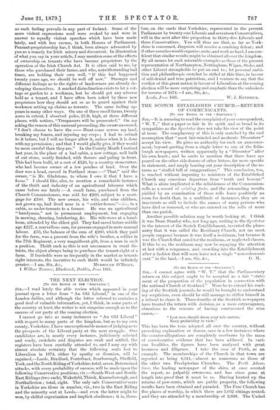THE SCOTCH ESTABLISHED CHURCH.—RETURNS OF COMMUNICANTS.
(To THE EDITOR OF THE " SPECTATOR."]
SIR,—It is amusing to read the complaint of your correspondent, " W. T.," that a paper so fair in its spirit and so broad in its sympathies as the Spectator does not take his view of the point at issue. The complacency of this is only matched by the cool assumption that " most fair-minded and moderate Dissenters " accept his view. He gives no authority for such an announce- ment, beyond quoting from a single letter to one of the Edin- burgh newspapers, written apparently by a " Dissenter " after his own heart ; and he omits to mention that there have ap- peared on the other side dozens of other letters, far more specific in statement, and amply bearing out your description of the re- turns as "stuffed full of exaggerations." This conclusion, too, is reached without imputing to ministers of the Established Church any conscious departure from "truth and honour." What is alone implicated is the reliableness of the Communion- rolls as a record of existing facts, and the astounding results yielded by an examination of these rolls leave positively no room for doubt that, in a multitude of instances, they are so inaccurate as still to include the names of many persons who have died or removed, or who are entered on the rolls of more than one parish.
Another possible solution may be worth looking at. I think it was Dean Stanley who, not long ago, writing to the Spectator in the interest of the Scotch Establishment, invented the pleas- antry that it was called the Residuary Church, not (as most people suppose) because it was itself a residuum, but because it was the Church that cared for the residuum, or neglected classes. If this be so, the residuum may now be repaying the attention at last with a vengeance, and crowding into the Establishment after a fashion that will soon leave not a single " non-coinmuni- cant " in the land.—I am, Sir, &c., G. M.


































 Previous page
Previous page